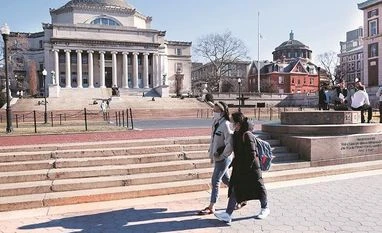Johns Hopkins University (JHU) filed a lawsuit in a federal court on Friday, pushing back against the the Trump administration order that would abruptly rescind accommodation for online learning during the Covid-19 pandemic for the nearly 5,000 international students at the university and thousands more across the country.
Johns Hopkins said the change in policy that requires international students be sent back to their home countries if they don't enroll in in-person classes, “suddenly and unexpectedly" plunged Johns Hopkins and virtually all of higher education in the United States into chaos.
Hundreds of thousands of Indian students in the US will be affected by this decision of the Trump administration.
The JHU's complaint, filed in US District Court in Washington, D.C., seeks a temporary restraining order against the proposal by the US Immigration and Customs Enforcement (ICE), stating that it is "arbitrary and capricious," unlawful, and a reversal of earlier guidance upon which months of careful planning is based.
The Baltimore-based private institution joins other well-known schools such as Harvard University, the Massachusetts Institute of Technology (MIT) and the University of California system in filing a lawsuit to stop the US government from enforcing the new rule.
"The administration's decision is gratuitous, cruel, and inimical to what this country is about," JHU President Ronald J Daniels said.
"The university was left with no option but to bring an emergency lawsuit in federal court to stop the administration from pushing ahead with an illegal and unconstitutional directive that, if permitted to stand, would fundamentally undermine the educational freedoms and humanitarian values that animate higher education in our country," he said in a statement.
"This unjust and discriminatory attack on international students cuts to the core of our mission of education and research," JHU Provost Sunil Kumar said.
"It cannot be allowed to stand," Kumar said.
The ICE rule applies to holders of two types of visas, including F-1 visas, which allow nonimmigrant students to pursue academic coursework in the US.
"The Trump administration's sudden announcement upends that careful consideration. It accounts neither for the risks associated with switching to an all in-person approach, nor for the possibility that we may have no choice but to revert to all online classes if the pandemic takes a turn for the worse," the JHU statement said.
The Trump administration's actions may force students to choose between increased exposure to a deadly virus and maintaining their visa status, the statement said, adding that the JHU will determine how it will execute its mission of research and education safely without government intervention.
The virus has killed more than 134,000 people in the US and infected over three million others, making it the worst-hit nation.
"The order came down without notice -- its cruelty surpassed only by its recklessness. It appears that it was designed purposefully to place pressure on colleges and universities to open their on-campus classrooms for in-person instruction this fall, without regard to concerns for the health and safety of students, instructors, and others," Harvard University President Larry Bacow said while reacting to the ICE's directive.
The US has the largest international student population in the world, with more than 1 million of the nation's higher education students, roughly 5.5 per cent of all college students in the US, coming from abroad, according to the nonprofit Institute of International Education.
The US State Department said earlier this week that international students are welcome in the country, adding that the policy "provides greater flexibility for nonimmigrant students to continue their education in the United States, while also allowing for proper social distancing on open and operating campuses across America."
To read the full story, Subscribe Now at just Rs 249 a month
Already a subscriber? Log in
Subscribe To BS Premium
₹249
Renews automatically
₹1699₹1999
Opt for auto renewal and save Rs. 300 Renews automatically
₹1999
What you get on BS Premium?
-
Unlock 30+ premium stories daily hand-picked by our editors, across devices on browser and app.
-
Pick your 5 favourite companies, get a daily email with all news updates on them.
Full access to our intuitive epaper - clip, save, share articles from any device; newspaper archives from 2006.
Preferential invites to Business Standard events.
Curated newsletters on markets, personal finance, policy & politics, start-ups, technology, and more.
Need More Information - write to us at assist@bsmail.in
)